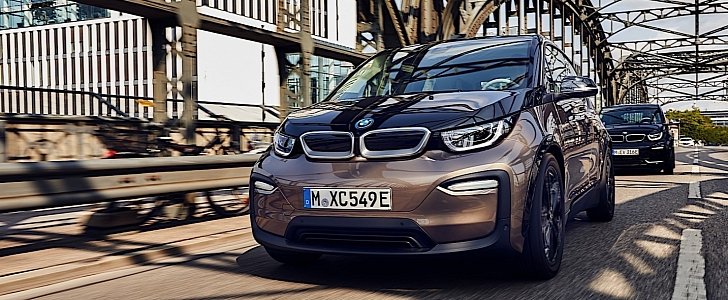The Jaguar XJ is now available exclusively with diesel power, and the Worldwide Harmonized Light Vehicle Test Procedure makes another victim in the Old Continent. BMW has confirmed the i3 REx has been cancelled in Europe, leaving the electric option to carry the torch.
In an e-mailed statement to InsideEVs.com, the Bavarian automaker believes that “customer demand is shifting to a pure-electric model.” There’s no mistaking BMW is making up excuses for not trying to make the range-extender motorcycle engine more efficient, but then again, the fast-charge infrastructure is gaining momentum in this part of the world.
There’s another reason BMW is pushing forward with the electric i3, and that is the 44.2-kWh battery introduced for the 2019 model year. With double the capacity from 2013 (21.6 kWh) and 30 percent more than the previous model (33.2 kWh), the i3 is starting to make sense even to the most demanding of customers interested in eco-friendly driving.
BMW has announced the 2019 model year will go on sale by the end of 2018, with first deliveries in Europe scheduled for early 2019. Powertrain output remains unchanged, translating to 125 kW for the i3 and 135 kW for the i3s. Range, on the other hand, is estimated between 285 and 310 kilometers (177 and 193 miles) for the larger battery.
The Environmental Protection Agency could peg the i3 with the 44.2-kWh battery option at more than 150 miles, which doesn’t appear to be bad at all for an electric vehicle. The thing is, Nissan offers up to 150 miles from the Leaf, which starts at $29,990 (not including the federal tax credit).
Then there are the Hyundai Kona Electric and Chevrolet Bolt (Opel Ampera-e in Europe), as well as the Model 3 from Tesla. With such competition breathing down its neck, the Bavarian automaker is at an obvious disadvantage in regard to value for money.
Turning our attention back to the 2019 BMW i3, the 42.2-kWh battery consists of eight modules with 12 cells each, translating to 120 Ah. The on-board charger is a single-phase unit rated at 7.4-kW, and for customers who plan to use fast charging more often, there’s an option for a three-phase, 11-kW system.
There’s another reason BMW is pushing forward with the electric i3, and that is the 44.2-kWh battery introduced for the 2019 model year. With double the capacity from 2013 (21.6 kWh) and 30 percent more than the previous model (33.2 kWh), the i3 is starting to make sense even to the most demanding of customers interested in eco-friendly driving.
BMW has announced the 2019 model year will go on sale by the end of 2018, with first deliveries in Europe scheduled for early 2019. Powertrain output remains unchanged, translating to 125 kW for the i3 and 135 kW for the i3s. Range, on the other hand, is estimated between 285 and 310 kilometers (177 and 193 miles) for the larger battery.
The Environmental Protection Agency could peg the i3 with the 44.2-kWh battery option at more than 150 miles, which doesn’t appear to be bad at all for an electric vehicle. The thing is, Nissan offers up to 150 miles from the Leaf, which starts at $29,990 (not including the federal tax credit).
Then there are the Hyundai Kona Electric and Chevrolet Bolt (Opel Ampera-e in Europe), as well as the Model 3 from Tesla. With such competition breathing down its neck, the Bavarian automaker is at an obvious disadvantage in regard to value for money.
Turning our attention back to the 2019 BMW i3, the 42.2-kWh battery consists of eight modules with 12 cells each, translating to 120 Ah. The on-board charger is a single-phase unit rated at 7.4-kW, and for customers who plan to use fast charging more often, there’s an option for a three-phase, 11-kW system.


































